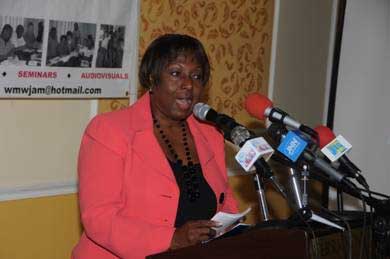 Minister Olivia Grange, Minister of Youth, Sport & Culture, holds a copy of Jamaica's draft Sexual Harassment Policy, as she addresses the Bureau of Women's Affairs sexual harassment forum held recently in Kingston.
Minister Olivia Grange, Minister of Youth, Sport & Culture, holds a copy of Jamaica's draft Sexual Harassment Policy, as she addresses the Bureau of Women's Affairs sexual harassment forum held recently in Kingston.
Kingston, (Panos): Minister of Youth, Sport and Culture, Olivia Grange, has indicated that Jamaica's draft National Sexual Harassment Policy should be passed within the 2009-2010 financial year.
"People do not know how to report sexual harassment or where to seek redress. This policy will be a guide to other organisations in creating their own sexual harassment policies," said Grange, whose ministry has direct responsibility for Women & Gender Affairs. "We intend that this legislation is passed within this financial year."
Grange was addressing a full auditorium of government workers and officials, business people, NGO representatives, representatives from women's organisations, community groups and the media at a Sexual Harassment Sensitisation Forum in Kingston recently.
Minister Grange held the draft Sexual Harassment Policy high and explained that it was a step towards sexual harassment legislation in Jamaica.
In Jamaica many people do not know how to define sexual harassment, let alone report it. As a daily part of living females endure lascivious looks, comments and gestures from men they know and total strangers.
Some people see nothing wrong with pinching or caressing another person as an expression of admiration whether the targets of their admiration welcome the attention or not.
In the workplace stories of male and female bosses who sexually harass their subordinates are common. The workplace victims are pressured to submit to unwelcome advances or risk demotion and job loss. Sexual harassment at work also plays out in subtle ways. The display of nude pictures, sexually suggestive graphics on coffee mugs and the computer, although inappropriate, are common. Many people see nothing harmful in these things.
"Any conduct of a sexual nature that is un-welcome or uncomfortable to the victim is sexual harassment," explains Mrs. Faith Webster, Executive Director of the Bureau of Women's Affairs. She was speaking at a Sexual Harassment Sensitisation Forum in Kingston put on recently by the Bureau of Women's Affairs.
In a recent release the Bureau of Women's Affairs said that sexual harassment in private and in public has become a "disturbing problem" in Jamaica. At the forum Mrs. Webster explained that sexual harassment is widespread and occurs across all social strata and age groups. Victims are mostly female, but reports of male victims are on the increase. This was also true for same sex harassment. Sexual harassment is a form of gender violence.
In response to this problem the Bureau of Women's Affairs has created a Sexual Harassment Policy for Jamaica. This national policy will address sexual harassment in workplaces, institutions and rented accommodation. The policy addresses issues such as an organisation's liability for sexual harassment and the fair treatment of both victims and perpetrators. In a 2005 survey the Bureau of Women's Affairs found that of 44 organisations surveyed only 5 had any sexual harassment policy. None of the 5 organisations were from the government sector.
Senator Dwight Nelson, Minister of National Security, also addressed the forum. He supported the speedy enactment of sexual harassment legislation in Jamaica, pointing out that sexual harassment is a public health issue.
"Jamaica's health services are unduly burdened because of violence against women."
He also pointed to the ingrained nature of sexual harassment in Jamaica.
"Many "big men" in Jamaica were brought up to believe that they should not sow their wild oats outside. But they were encouraged to use their domestic helpers," he said.
Sexual harassment by definition is also a misuse of power, as Hilary Nicholson, Co-ordinator or Women's Media Watch pointed out. "Unless we understand the power relations in our society it is impossible to understand sexual harassment," says Nicholson.
Attendees at the forum wanted to know about any plans to address sexual harassment in public. Dr. Eileen Boxill, Attorney-at-Law pointed out that sexual harassment in public would not be easy to prosecute.
"It presents some gray areas that might not fit comfortably in legislation." However, she added that in some cases sexual harassment sanctions might exist in criminal law, for example indecent assault.
The sexual harassment forum marked the closing session of a national project to reduce violence against women. The project which was funded by the United Nations Development Fund for Women (UNIFEM) involved months of training and sensitisation programmes for Jamaican government workers and human resource practitioners.
(End/01/06/2009Panos)